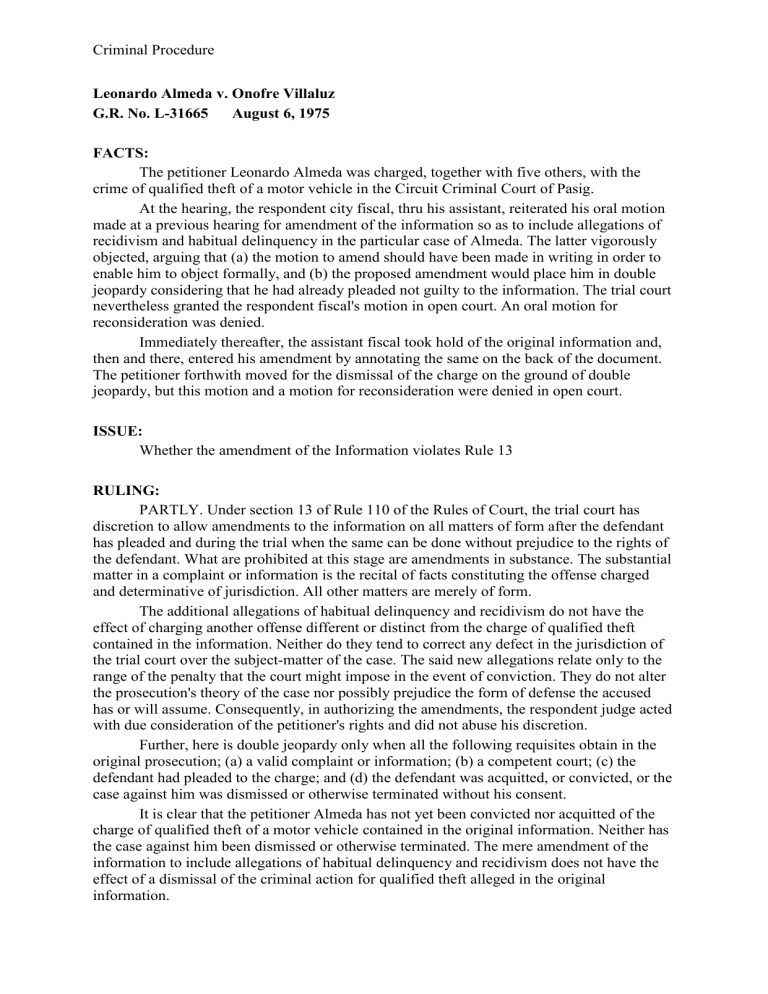
Criminal Procedure Leonardo Almeda v. Onofre Villaluz G.R. No. L-31665 August 6, 1975 FACTS: The petitioner Leonardo Almeda was charged, together with five others, with the crime of qualified theft of a motor vehicle in the Circuit Criminal Court of Pasig. At the hearing, the respondent city fiscal, thru his assistant, reiterated his oral motion made at a previous hearing for amendment of the information so as to include allegations of recidivism and habitual delinquency in the particular case of Almeda. The latter vigorously objected, arguing that (a) the motion to amend should have been made in writing in order to enable him to object formally, and (b) the proposed amendment would place him in double jeopardy considering that he had already pleaded not guilty to the information. The trial court nevertheless granted the respondent fiscal's motion in open court. An oral motion for reconsideration was denied. Immediately thereafter, the assistant fiscal took hold of the original information and, then and there, entered his amendment by annotating the same on the back of the document. The petitioner forthwith moved for the dismissal of the charge on the ground of double jeopardy, but this motion and a motion for reconsideration were denied in open court. ISSUE: Whether the amendment of the Information violates Rule 13 RULING: PARTLY. Under section 13 of Rule 110 of the Rules of Court, the trial court has discretion to allow amendments to the information on all matters of form after the defendant has pleaded and during the trial when the same can be done without prejudice to the rights of the defendant. What are prohibited at this stage are amendments in substance. The substantial matter in a complaint or information is the recital of facts constituting the offense charged and determinative of jurisdiction. All other matters are merely of form. The additional allegations of habitual delinquency and recidivism do not have the effect of charging another offense different or distinct from the charge of qualified theft contained in the information. Neither do they tend to correct any defect in the jurisdiction of the trial court over the subject-matter of the case. The said new allegations relate only to the range of the penalty that the court might impose in the event of conviction. They do not alter the prosecution's theory of the case nor possibly prejudice the form of defense the accused has or will assume. Consequently, in authorizing the amendments, the respondent judge acted with due consideration of the petitioner's rights and did not abuse his discretion. Further, here is double jeopardy only when all the following requisites obtain in the original prosecution; (a) a valid complaint or information; (b) a competent court; (c) the defendant had pleaded to the charge; and (d) the defendant was acquitted, or convicted, or the case against him was dismissed or otherwise terminated without his consent. It is clear that the petitioner Almeda has not yet been convicted nor acquitted of the charge of qualified theft of a motor vehicle contained in the original information. Neither has the case against him been dismissed or otherwise terminated. The mere amendment of the information to include allegations of habitual delinquency and recidivism does not have the effect of a dismissal of the criminal action for qualified theft alleged in the original information.